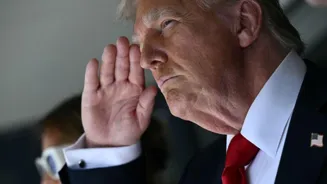However, the principal difficulty lies in the fact that not many within the United States who oppose Trump’s tariff tantrums are able to counter, resist or confront an administration that is vindictive against the opponents and resorts to retribution or revenge.
President Trump does not spare anyone who makes statements or brings out reports on issues that run counter to his policies. The latest example is the quick removal of the head of the Bureau of Labour Statistics, Erika McEntarfar, after the bureau released the job statistics showing that the US labour market is not as resilient as expected. The latest job report indicated that Trump’s tariff war and other economic policies have begun to demonstrate the negative consequences of Trump policy.
American consumers are yet to feel the adverse impact of high tariffs on imports, partly because some of the US’ importers bought foreign goods in bulk and put them in stores before the new tariff would kick in, and partly because some of the import duties are yet to be systematically implemented, as many countries are still in the process of negotiating with the officials of the Trump Administration.
The price pressure on consumers will certainly pose a serious political challenge to President Trump. But in order to deal with that possible outcome, the Trump supporters can come up with false data and build an untruthful narrative. Unfortunately, the Democratic Party also appears to be a bystander and unable to counter Trump effectively.
The big American companies that contribute to election campaign financing are also mute spectators for fear of becoming the target of Trump’s wrath. President Trump’s dislike for foreigners is clearly vindicated in his harsh treatment of the immigrants. His aversion for foreign countries is reflected in his call to American companies to return and base their manufacturing activities at home. But this Trumpian drive would harm US companies that have invested around the world, taking advantage of cheap land and labour, by implication, making America richer than other countries.
Trump's anxiety about a rising China that would ferociously compete economically with the US is explicable. But when the Apple company sought to exit from China and enter the Indian market, Trump threatened high duties on the products of the company! It gives the impression that his main goal is not to allow India to grow, even if it is in American interest.
Indian economic performance is viewed by President Trump as a “dead economy”, not because he lacks basic knowledge about India but because he would not like to see an India that would question his false statements or assert itself as a country that stands by its policy of strategic autonomy.
Trump seems persuaded that his vision of “America First” would be good for his country. Actually, his America First policy would benefit him and his supporters but harm the United States and the world. He wrongly assumes that in a globalised world with complex interdependence among countries, the US economy can thrive all by itself. He seems to visualise that what is good for the globe is not good for America. Otherwise, he would not have embarked upon a journey that would make the US allies suffer, make the strategic partners reassess the value of partnering with the US and induce the competitors to resolve to stand up to the US.
By his decision to withdraw the US membership from global institutions and initiatives, such as the World Health Organisation, the Paris Climate Accord, Unesco and the disrespect for the World Trade Organisation, Trump seeks to make America a bolted island country in a deeply interconnected world. Can such an America protect itself against the next pandemic? Can the Americans breathe safe air when the world gets progressively polluted along with rising earth temperature? Can it sustain a durable trading relationship by browbeating countries to accept its policies and diktats through bilateral networks?
So far Trump has been in the commanding position for a little above six months. He has a distance to go before he is supposed to step down in January 2029. His recent contemplation for an unconstitutional third term in the White House appears to have been abandoned for the time being. Yet, whether there will be a peaceful transfer of power after the 2028 presidential election in Washington, DC, cannot be predicted now. He pardoned many who were convicted and sentenced to jail due to their involvement in the insurrection of January 6, 2021. Will there be another insurrection?
A lot will depend on how the political scene unfolds within the United States. There is an opportunity for the American voters to send Trump a message in the November 2026 congressional election. There are still openings for Corporate America to press upon him to abandon his damaging tariff policies and other economic measures. The think tanks and the American universities, where academia plays a constructive role in the policymaking ecosystem, are struggling hard to make compromises with the Trump Administration to ensure restoration of federal funding. But still, the American academia can elucidate whether the proverbial emperor is without clothes.
But how the international community responds will also determine if the current American imperial presidency is a passing phenomenon. The European allies have been left high and dry by Trump and are clamped with a 15 per cent tariff, which is much higher than the 2.5 per cent tariff that was imposed earlier. The Nato member countries have been bulldozed into spending 5 per cent of their GDP on defence when they are undergoing economic downturn and energy shortages.
Japan and South Korea are forced to pay more to keep the alliance structure alive. India was one of the first countries in 2025 to start negotiations with the Trump team on bilateral trade. After months of negotiations, the Trump Administration keeps pressuring India to open its agricultural sector, which would surely hurt the millions of Indian farmers. This pressure is compounded by its insistence on India to stop buying Russian energy resources, which would again grievously affect India’s energy security.
China stood firm and responded by restricting rare earth materials. It pinched the US, and Trump promptly relaxed its restrictions on technology and chip trade. But China’s export controls hurt many other countries, including India. As the world is facing Trump’s tariff war, it remains utterly divided. There were some whispers about the EU, China, Japan and many others coming together to confer on how to manage the uncertainties in international trade and overall political economy. But whispers have not given way to any concrete steps.
The international community rightly thinks that Trump is not America. Numerous countries around the world seem to be interested in waiting him out. But the big question is whether Trumpism will survive Donald Trump. All major countries look prepared to work for a truce with Trump. However, the truce should not be at the cost of the stability of the international trade ecosystem. Trump’s economic war against the world will not end soon unless there are countermeasures against Trumpian unilateralism.
The author is founding chairperson, Kalinga Institute of Indo-Pacific Studies, and editor, India Quarterly. The views expressed in the above piece are personal and solely those of the author. They do not necessarily reflect Firstpost’s views.













